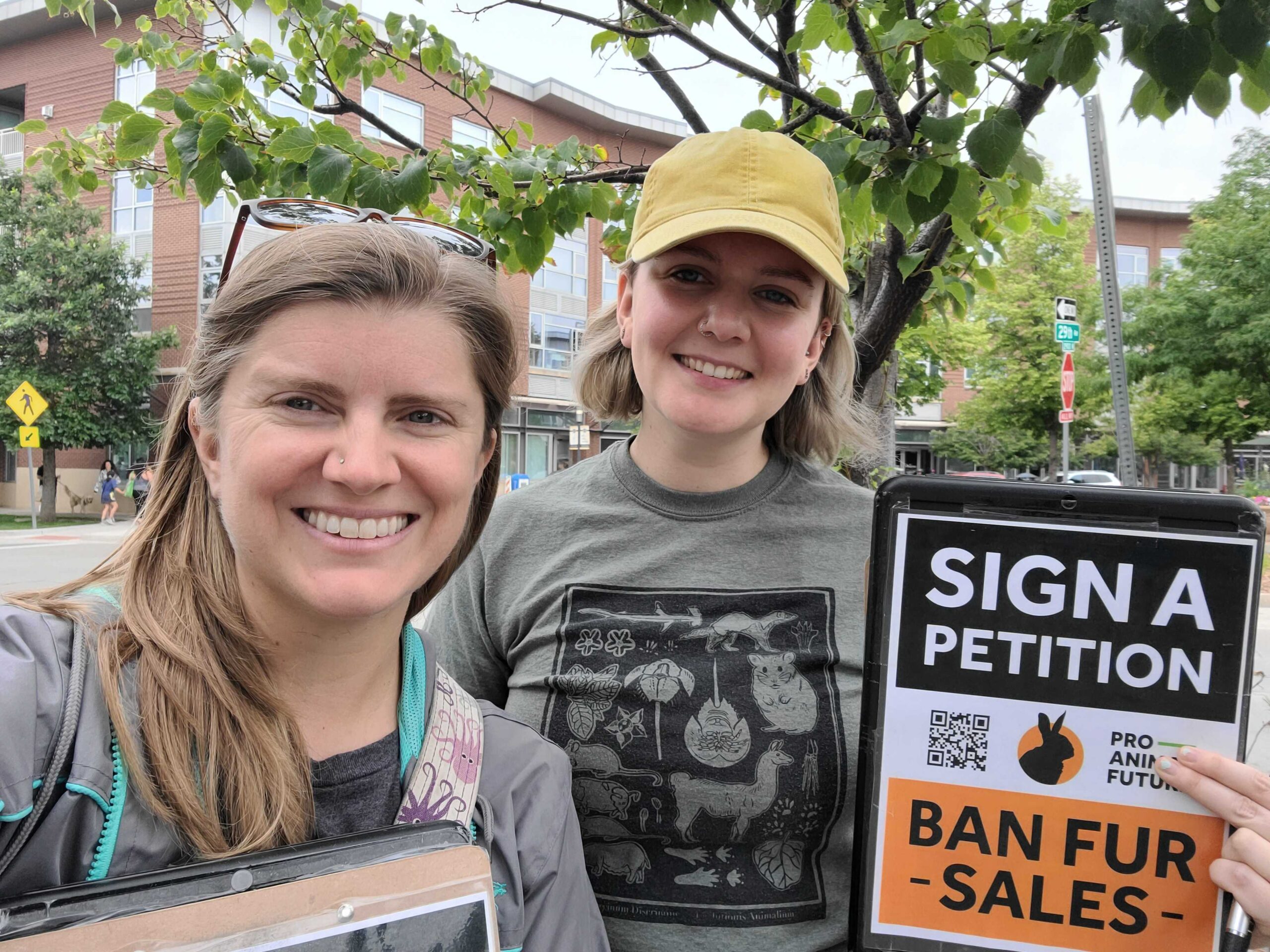In November 2024, Denver voters will have the opportunity to make history by voting on Prop 308, a transformative piece of legislation that seeks to ban the sale, distribution, and manufacturing of new fur products within the city. While this measure includes some exceptions, such as allowances for Native American cultural practices and thrifted fur items, passing this ordinance would still mark a major step forward in the fight against animal cruelty.
The Problem with Fur
Fur products are derived from animals that endure unimaginable suffering on fur farms, where they live in cramped, filthy conditions before being killed using brutal methods. Fur farming typically involves animals like minks, foxes, chinchillas, and rabbits, which are kept in small cages, often stacked in rows, with little room to move or exhibit any natural behaviors. The stress, boredom, and confinement these animals experience can lead to severe psychological distress (called zoochosis), which manifests in repetitive behaviors like pacing or self-mutilation.
Investigations into fur farms have revealed widespread animal welfare violations, including animals being killed through methods like anal electrocution, gassing, or suffocation. These methods are chosen both for their low cost and the fact that they don’t cause damage to the fur, rather than considering the animal suffering. Unsurprisingly, these cruel practices have meant that fur farming has fallen out of favor in much of the world, with countries like the UK, Italy, and Austria banning fur farms entirely, along with other countries introducing stricter welfare regulations.
Despite this, the global fur industry still kills millions of animals each year. In the United States, there are approximately 245 fur farms across 22 states, producing over 3 million pelts annually. In Denver, at least six high-end stores in the city continue to sell fur, catering to a small, wealthy customer base who still view fur as a luxury item, despite the shifting cultural perception around animal welfare and fashion.
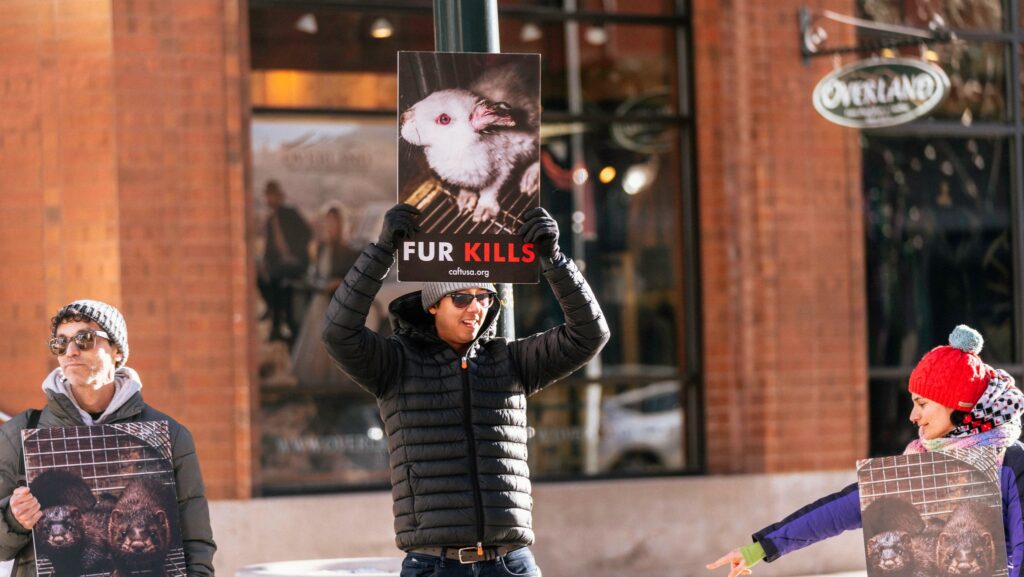
Introduction to Ordinance 308
Prop 308 is a ballot measure that’s been designed to prohibit the sale, display, or manufacture of new fur products within the City and County of Denver. Starting on July 1, 2025, retailers, wholesalers, and individuals would no longer be able to offer new fur items for sale or distribution within the city limits. This measure applies to all types of fur products, from luxury fur coats and accessories to home decor items like rugs or blankets made from animal pelts. You can find the official legislation text here.
What is a “Fur Product”?
According to the ordinance, fur is any animal skin or part thereof with hair, fleece, or fur fibers attached, whether in its raw or processed state. The term “fur product” extends to any item made in whole or in part from fur, including clothing, shoes, handbags, and home accessories. Items like fur-lined gloves, coats, scarves, or even decorative fur-trimmed pillows would be covered under the ordinance, while leather, wool, and sheepskin (think Uggs) would not be.
This definition helps to clarify exactly what Prop 308 aims to restrict to avoid any confusion over products that have similar appearances but come from different parts of the animal or different processes.
Exceptions to the Denver Fur Ban
Prop 308 represents a significant move toward eliminating new fur products in Denver; however it does contain some key exceptions that you should be aware of. These exceptions reflect the complexity around cultural traditions and sustainability, ensuring that the ordinance doesn’t impose unreasonable restrictions on certain communities or individuals. The ordinance is not about imposing a one-size-fits-all solution or alienating certain communities. Instead, it aims to strike a balance between cultural sensitivity and the ethical need to reduce animal suffering.
1. Wool and Leather Exemption
Certain materials that might resemble fur are considered to be exceptions and are not included in the ordinance. For example:
- Leather products (with the hair removed) will not be banned.
- Cowhide with the hair attached is not considered fur, and won’t be impacted.
- Lambskin, shearling, or sheepskin with the fleece still attached also does not fall under the definition of a fur product.
- Additionally, wool and other sheared fibers are not considered fur products.
2. Native American Fur Trading Exemption
The ordinance includes an exception for Native American tribes that use fur for traditional cultural, spiritual, or religious purposes. This exemption allows members of federally or state-recognized tribes to continue buying, selling, and trading fur in accordance with their cultural practices.
This exemption respects the rights of Indigenous communities to maintain their cultural heritage while still addressing the broader goal of reducing the demand for new fur. Native American cultures have long used animal skins and fur in traditional garments, regalia, and ceremonies. Prop 308 ensures that these practices can continue without impeding the movement toward phasing out fur in the fashion industry more broadly.
While some fur bans that have passed in other cities across the country do not include such an exemption, one of the priorities when drafting Denver’s ordinance was to respect the principle of sovereignty for Indigenous nations. The legislative language used in Denver’s fur ban ordinance is in line with the Native American exemption seen in the statewide fur ban passed by California legislators in 2019, and is actually even broader to include members of any state recognized Native American tribe. By researching other policy language while also consulting with a community organizer from the Navajo Nation, Pro-Animal Denver has ensured that this measure balances the goal of reducing fur trade with respect for cultural traditions.
3. Thrifted and Used Fur Products Exemption
Another exemption in Prop 308 allows for the continued sale of fur products made with used fur. Businesses or individuals that don’t primarily sell fur, such as second-hand stores, pawn shops, and non-profit organizations, can continue to buy and sell fur products made from pre-owned fur. This exception acknowledges that banning the sale of fur products made with second-hand fur would likely lead to unnecessary waste without contributing significantly to reducing the demand for new fur.
This means that Denver residents can continue to purchase thrifted fur items or inherit vintage pieces without violating Prop 308, while still addressing the more urgent issue of preventing the production and sale of new fur. The goal here is not to penalize those who repurpose existing items, but to stop the cycle of cruelty that results from the fur industry.
4. Taxidermy Exemption
The ordinance also does not apply to any fur products derived from taxidermy. Taxidermy is the process of preserving an animal’s body for display or educational purposes, often used in museums or private collections. Since taxidermy animals are not killed for the purpose of harvesting their fur, this practice is excluded from the ordinance.
5. Federal and State Law Compliance
There have also been allowances made for any fur products where the activity is expressly authorized by federal or state law. This ensures that Prop 308 does not create any conflicts with other legal frameworks, safeguarding any lawful fur trade that may exist under national or state-level regulations.
What Happens on July 1, 2025?
The measure will go into effect on July 1, 2025, allowing retailers and manufacturers time to adjust their product lines. This schedule aims to minimize any economic disruption by giving businesses time to sell their existing fur inventory and introduce new products.
This transition period demonstrates the care that’s been put into recognizing the economic needs of local businesses alongside the ethical need to stop selling fur. Many of the businesses that would be affected by the fur ban already sell a wide variety of non-fur products, and will have the opportunity to expand these product lines while phasing out fur.
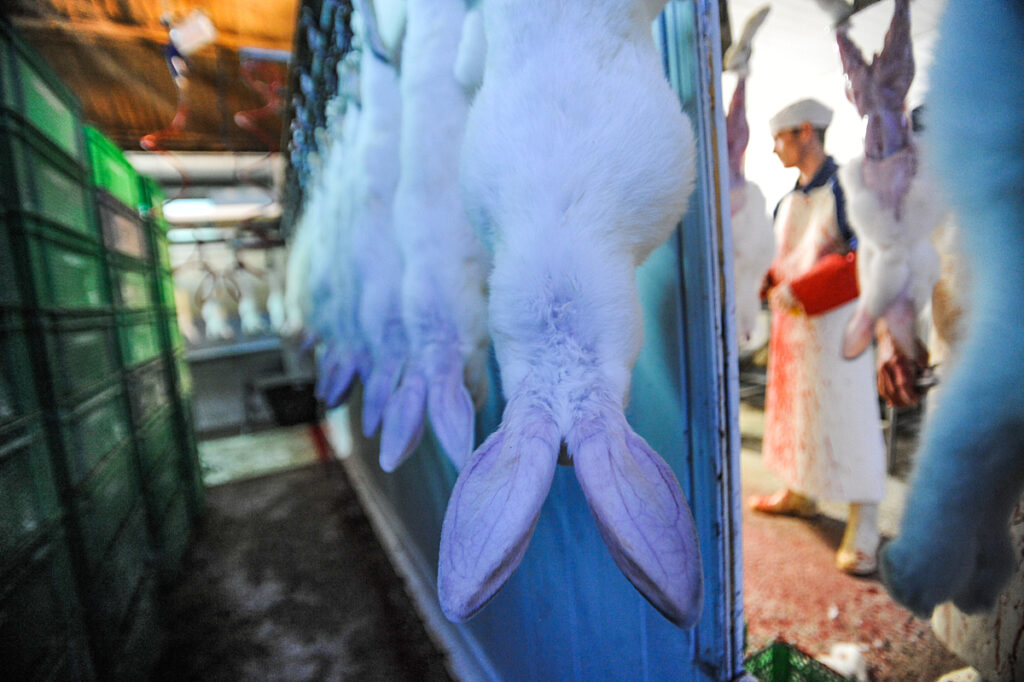
Addressing Community Concerns
Prop 308, which targets the large-scale fur industry responsible for significant animal welfare issues and environmental impacts, represents a significant step towards more ethical and sustainable practices in the fashion industry. While some concerns have been raised by niche markets such as the fly-fishing community, we have engaged in constructive dialogue with fly-fishing business owners in Denver to address this.
Like other fur products such as felt hats, synthetic and plant-based alternatives have rendered fur unnecessary in fly tying, offering the same or better performance without the cruelty. They’re comparable in price and often even more affordable than real fur, can be easily found in stores selling fly tying supplies, and offer other benefits like greater water resistance, more durability, and a lighter feel than real fur. That said, the fly fishing industry makes up an extremely small percentage of fur sales.
If the measure passes, proponents have expressed a willingness to support an exemption for fly-fishing shops through Denver’s City Council. The fishing community in Washington State recently expressed similar concerns in response to the state’s proposed fur ban, which also prompted the introduction of exemptions. This would help to balance the ethical goals of the ordinance while accommodating the fly-fishing community in Denver.
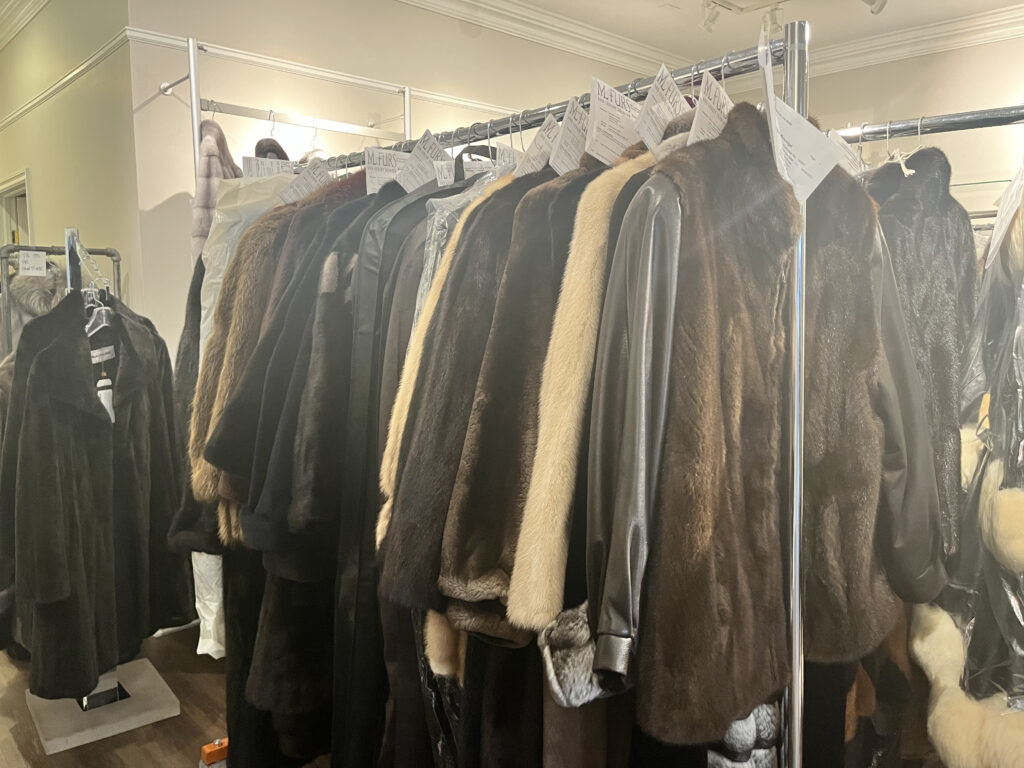
Which Stores Sell Fur in Denver?
As of 2024, Denver’s fur industry is relatively small but still active, with at least six retail stores selling fur products, including Overland Sheepskin, Louis Vuitton, Neiman Marcus, A Tsagas Furs and Leathers, Jonval Leathers and Furs, and Dan Sharp Luxury Outerwear. These luxury retailers sell fur coats, jackets, and accessories with price tags ranging from $1,000 to $30,000.
By voting “yes” on Prop 308, Denverites can help accelerate this trend and encourage these retailers to transition away from fur. Many fur stores in Denver already offer a wide range of non-fur products, such as leather, shearling, and other high-end materials, meaning that the economic impact of phasing out fur is likely to be minimal.
How Much Fur is Sold in Denver Today?
Similar to other states and countries, the fur industry in Denver has positioned fur as a luxury item, a symbol of status, and a statement of wealth. However, with its exorbitant prices and awareness of the cruelty involved in the industry, more consumers are turning away from animal-derived products. Fur sales have been on the decline globally, particularly in the fashion industry. According to a 2020 survey from Research Co., 71% of Americans are opposed to killing animals for their fur. This shift in public opinion has been driven in part by increased awareness of the inhumane conditions on fur farms, as well as the rise of ethical fashion alternatives.
Major fashion houses like Gucci, Chanel, Burberry, and Prada have announced in recent years that they will no longer use fur in their collections, signaling a significant cultural shift within the fashion industry. These brands have recognized that consumers are demanding cruelty-free options, and they need to adapt product lines accordingly.
Why Voting YES on Prop 308 Matters
While some may argue that the exceptions in Prop 308 dilute its impact, the truth is that voting yes on this measure is still a crucial step toward ending the sale of new fur products in Denver. Here’s why:
1. Reducing Animal Suffering
The main goal of this ordinance is to reduce animal suffering, particularly for the millions of animals raised and killed on fur farms each year. Minks, foxes, chinchillas, and other animals bred for their fur endure lives of misery in factory-like conditions. By banning the sale of new fur, Denver can help reduce demand for these cruel products and contribute to the decline of the global fur industry.
2. Encouraging Ethical Consumerism
Passing Prop 308 would send a strong message to retailers and consumers that Denver is a city that values compassion and ethical consumerism. As more cities and states pass fur bans, the fashion industry will continue to shift away from fur and embrace cruelty-free alternatives that are both stylish and sustainable.
3. Setting a Precedent for Colorado
If Denver successfully passes this ordinance, it would encourage a statewide fur ban in Colorado, following in the footsteps of California. By demonstrating that local fur bans can be implemented without economic disruption, Denver can lead the charge for broader legislative charge at the state level.
4. Protecting Public Health
In addition to the ethical concerns surrounding fur farming, there are also public health risks to consider. The COVID-19 pandemic highlighted the dangers of zoonotic diseases, which can jump from animals to humans. Mink farms, in particular, have been identified as breeding grounds for coronaviruses, leading to the mass culling of millions of mink in Europe and North America. By reducing the demand for fur, we can also reduce the risk of future zoonotic disease outbreaks.
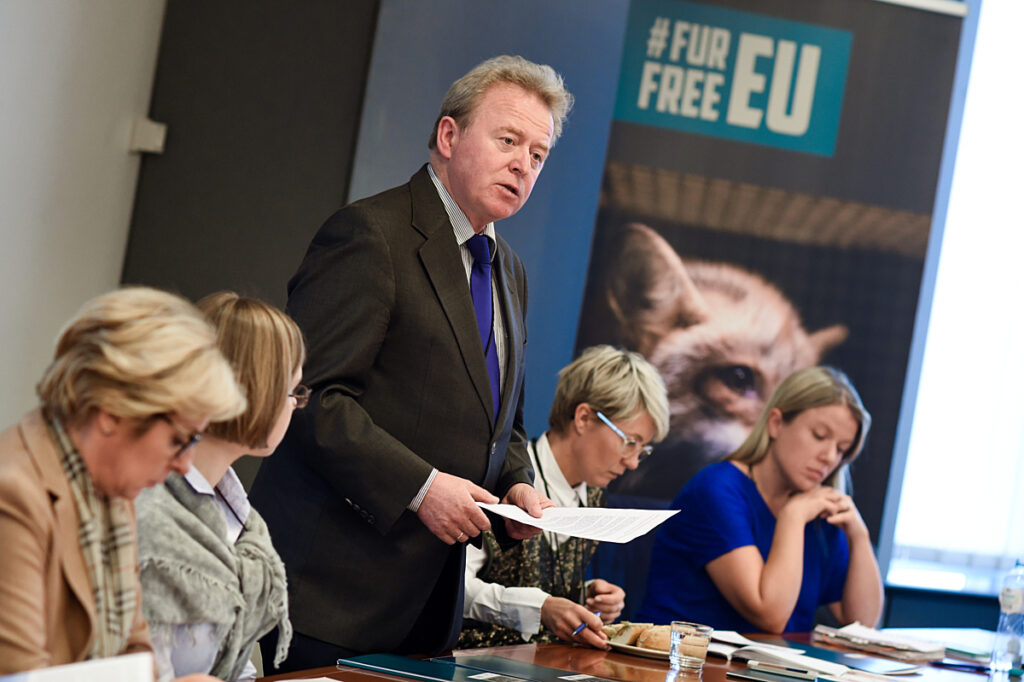
Fur Bans: The National Context
Denver is not the first city in the United States to look at implementing these types of legislation. California became the first state to ban animal fur when Assembly Bill 44 went into effect in January of 2023. Cities like San Francisco, Los Angeles, and West Hollywood have also passed their own local ordinances. Fur bans have also been implemented in cities across Massachusetts, Michigan, Florida, and Pennsylvania. In 2021, Boulder became the first city in Colorado to ban fur sales, and now Denver has the opportunity to follow suit. These grassroots campaigns are building momentum for broader change.
Separating Myth From Fact
As with any piece of legislation, there are those who oppose Ordinance 308. Here are some common arguments against the ordinance and why they fall short:
Myth: “Banning fur will hurt local businesses and cost jobs.”
Fact: The number of businesses in Denver that sell fur is extremely small, and most of these retailers already sell a wide range of non-fur products. Transitioning away from fur is not only possible but inevitable, given the global trend toward cruelty-free fashion. Retailers can easily replace fur items with ethical alternatives without significant economic impact.
Myth: “People should have the freedom to choose whether or not to buy fur.”
Fact: While personal choice is important, it should not come at the cost of extreme animal suffering. The fashion industry is evolving, and consumers have a wide range of cruelty-free options available to them. Prop 308 strikes a balance by allowing the sale of second-hand fur while eliminating the demand for new fur.
Myth: “Fur is sustainable and eco-friendly.”
Fact: The environmental impact of fur farming is significant, with studies showing that its impact is 28 times higher than other textiles. Mink fur production specifically creates nearly 400 times more water pollution than polyester and produces substantially higher levels of air emissions compared to other textiles. Sustainable alternatives, including faux fur made from recycled materials, offer a more eco-friendly solution.
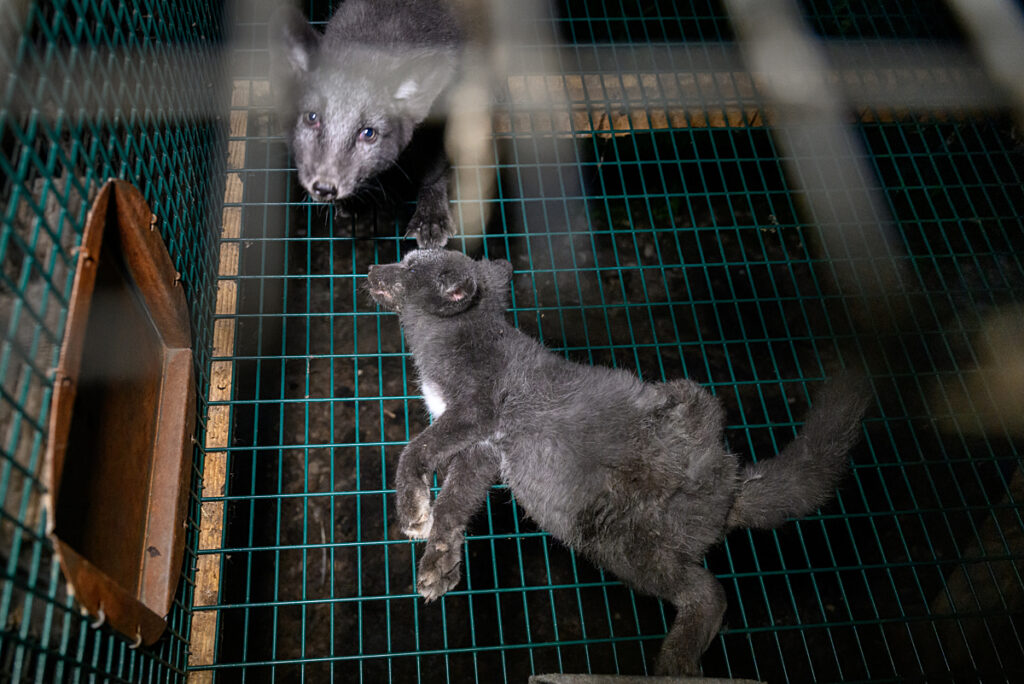
It’s Time to Leave Cruel Fur Behind
It’s 2024 and the time has come to move beyond fur. Societal values are evolving, and consumers are increasingly rejecting animal cruelty. Ordinance 308 represents a critical opportunity for Denver to take a stand against this outdated industry and join the growing movement toward compassionate and ethical fashion.
By voting yes on Ordinance 308, Denverites can help reduce animal suffering, protect public health, and send a powerful message to the fashion industry that cruelty has no place in modern society. This ordinance includes a few exceptions to protect cultural integrity, but its overall impact will be significant, paving the way for future fur bans across Colorado and beyond.
This November, let’s make Denver a leader in the fight against fur. Vote YES on Ordinance 308 today and be part of a movement that stands for compassion, progress, and justice for animals.

